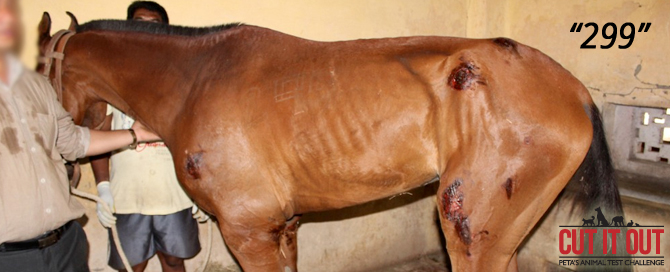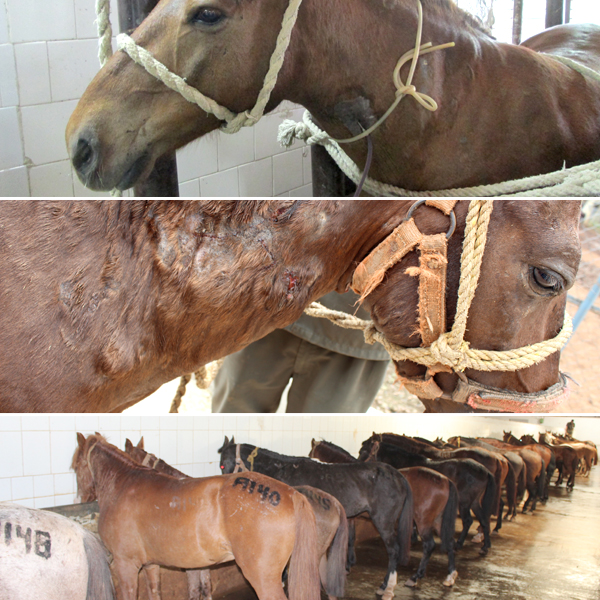Liberty Research, Inc., Animal Test Challenge, "299", Animalearn, University of Pittsburgh, Animal testing, Beagle Freedom Project, National Institutes of Health (NIH)
No Public Money for Animal Abuse
Universities get billions of dollars a year from the National Institutes of Health (NIH) to conduct research - much of it done on live rats and mice. But with these substantial grants comes an understanding that the universities will abide by federal animal welfare guidelines in their treatment towards these lab rodents. Sadly, that is not always the case.
No clearer example can be made than that of the University of Minnesota which according to a recent report, ranks as one of the worst animal abusers when it comes to animal research. Yet, their more than five dozen violations over a 2.5 year period hasn't barred them from receiving American taxpayer funds. In one gruesome case, researchers drew blood from behind rodents' eyes. The animals weren't given any type of pain relief. These stories are unfortunately too common.
Although rats and mice make up 95% of lab test animals, they have no federal protections. Meaning that they can be drowned, suffocated, starved or denied pain relief by researchers, and there is no penalty for this abuse. So even if universities break their animal-care agreements with the government they are likely not to be punished.
That is not ok. The NIH needs to step up and ask for more of the schools they give our money to. Because every time a public dollar goes towards animal cruelty we become complicit in the abuse.
It is time we ask the NIH to deny research grants to schools that cannot abide by federal animal care guidelines. Sign the petition and tell the NIH "No Pain in My Name!"

Starting January 1st, 2018, universities and other publicly funded institutions will have to follow a new guideline: they must include adoption policies for the dogs and cats they use for research on their websites. Beagle Freedom Project, a non-profit organization dedicated to saving beagles, and other animals from laboratories and adopting them into loving homes, spearheaded the legislation named the Research Dogs and Cats Adoption Act.
According to the U.S. Department of Agriculture’s Animal and Plant Health Inspection Service, 820,812 animals were used last year for research, including 60,979 dogs and 18,898 cats.
Beagles are, sadly, the most commonly used breed in research. The beagle’s docility makes them the ideal candidate for biomedical laboratories, universities, medical, and veterinary schools. Beagles aren’t the only victims of lab experiments, however. People for the Ethical Treatment of Animals (PETA) estimates 100 million mice and rats are used in research each year.
Prior to the legislation, nicknamed Beagle Freedom Bill, the future for animals no longer needed for research was unclear. But now, if an animal is deemed adoptable by the institution’s veterinarian, the institution must make “reasonable efforts” to offer the animal up for adoption, either through private placement or an animal adoption organization, according to the Beagle Freedom Bill. “In most cases, like at the University of Illinois, once the animal is adoptable a lot of times students, family or faculty do adopt them,” said Sen. Linda Holmes, who sponsored the legislation.
The ultimate goal, of course, is to implement a ban on all animal testing. Until that happens – and if you’ve ever tried to lobby for animal welfare or environmental legislation, you know how painstaking the process is – we need to work towards smaller successes. Change will not occur overnight.
To learn more about Beagle Freedom Project, visit their website. They offer different ways to get involved, from organizing fundraisers to helping spread the word about the work they do. And if it’s doable, consider fostering or adopting a beagle previously used in research. (Of course, first, learn all you can about what it’s like to rehabilitate a former lab animal before bringing one home.) And please be sure to look for products that have a “cruelty-free” label, which signifies products were made without the use of animal tests. Image source: Clay Larsen/Flickr
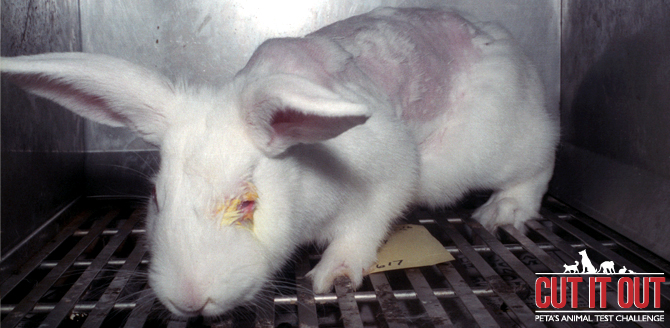 Bureaucracy Leads to Pointless Killing
Bureaucracy Leads to Pointless Killing
It's said that bureaucracy kills initiative. In the case of the European Chemicals Agency (ECHA), bureaucracy may lead to killing animals in cruel and potentially avoidable experiments.
Donate Now!
Now, you have a special opportunity to help us work to stop the abuse of animals in laboratories.
Please go to "Cut It Out"—PETA's Animal Test Challenge today.
Under the Registration, Evaluation, Authorisation and Restriction of Chemicals (REACH) regulation, ECHA is still insisting on using animals to test chemicals, including cosmetics ingredients, under certain circumstances. Scientists with PETA's international affiliates have estimated that approximately 1 million animals have already been killed under REACH—deaths that were likely painful and slow. Animals are force-fed chemicals, and substances are applied to their eyes or sensitive skin, leading to terrible suffering and death, even though reliable, non-animal methods exist for many of the tests conducted.
This horror is still happening. As you read this e-mail, some 2,000 gentle mice, monkeys, rabbits, rats, and other animals are facing extreme suffering in reproductive and developmental toxicity studies—and more deadly tests will undoubtedly be requested in the coming months.
The impact of REACH is not confined to Europe but has a global influence, with millions of animals under threat from it and other, similar chemical-testing programs around the world.
Will you please support PETA's work against cruel experiments on mice, monkeys, rabbits, rats, and other animals with your gift today to "Cut It Out"—PETA's Animal Test Challenge?
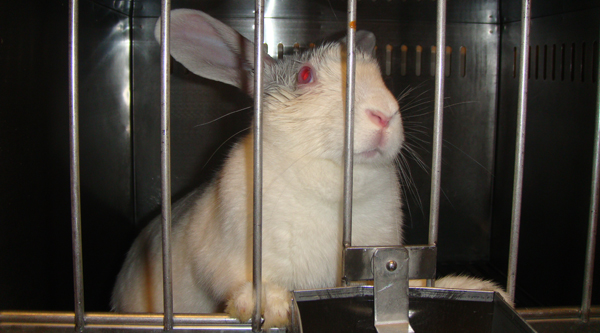 If you are hesitating even a bit, please think about a rabbit we'll call Lela. (Experimenters refer to most animals by numbers, not names.) Like all rabbits, she is a sweet, social animal. She has a gentle nature and is quite inquisitive. Her mild temperament and small size make her desirable to experimenters. She will be kept in a bare metal cage, force-fed a cosmetics ingredient, and then killed.
If you are hesitating even a bit, please think about a rabbit we'll call Lela. (Experimenters refer to most animals by numbers, not names.) Like all rabbits, she is a sweet, social animal. She has a gentle nature and is quite inquisitive. Her mild temperament and small size make her desirable to experimenters. She will be kept in a bare metal cage, force-fed a cosmetics ingredient, and then killed.
I know a rabbit named Lela who is in the loving home of a PETA U.S. employee, and the thought of rabbits, mice, monkeys, rats, and other animals who are as precious and harmless as she is suffering in experiments makes me feel sick.
Animals are, at this very minute, facing horrific pain and misery in cruel tests. Please take action for them today by donating to "Cut It Out"—PETA's Animal Test Challenge.
He was known only as "299" – the number given to him by experimenters.
Workers stab huge needles into the veins of animals like 299, who suffer immensely in antitoxin factories in India. Each time, litres of blood are siphoned from their bodies, leaving them debilitated. And that's not all that's done to them – please read on.
Animal Welfare Board of India–authorised inspectors from PETA India and prominent veterinary colleges found 299 with a severe and crippling hoof condition. His thin body was covered with painful pressure ulcers. He was one of many horses, donkeys, and mules suffering from open wounds, malnutrition, and other serious health conditions in this shameful blood collection dump.
Will you help us end the misery of horses, monkeys, dogs, rabbits, and other animals by donating to "Cut It Out" – PETA's Animal Test Challenge today? Your much-needed gift will be matched – pound-for-pound – up to our £250,000 goal.
Antitoxins are important medicines, but believe it or not, many are still made using the same old, cruel methods developed more than a century ago. Pharmaceutical companies "harvest" them from the blood that's drained from donkeys, mules, and horses like 299. In this process, the animals are first injected with a poisonous substance (a toxin). Then, after their immune system has responded, a massive amount of their blood is drawn. But the misery endured by these animals goes far beyond the pain of being repeatedly poisoned and forcibly bled.
At these companies, PETA India's inspectors documented that, although there were paid veterinarians on the premises, severe health conditions – including anaemia, infections, swollen limbs, and malnutrition – were often ignored. Many of the animals were discovered in crowded, filthy enclosures, where they were forced to stand and lie in their own accumulated urine and faeces on hard floors that left some with painful joint conditions. Basic grooming and husbandry practices seemed almost non-existent, even as workers handled the animals to collect blood from them over and over again.
Nearly everywhere the inspectors looked, they found violations of laws and guidelines. Many of the facilities where they witnessed some of the worst abuse and neglect – including the one where they found 299 – weren't even registered with the Indian government authority that issues permits for these procedures!
By donating to PETA today, you'll help expose such hideous abuse – and strengthen our vital work to stop cruel experiments on animals.
Since the release of PETA India's disturbing inspection report, thousands of people have called for the Indian government to deny or revoke these horrific facilities' licences to use animals. But stopping the suffering of the thousands of horses, donkeys, and mules who are abused in antitoxin production will take more than closing a few facilities.
That's why the PETA International Science Consortium Ltd. – an organisation that coordinates the scientific and regulatory expertise of PETA and its affiliates – is funding ground-breaking new research into the manufacturing of antitoxins in laboratories. This exciting research is a critical step towards replacing cruel antitoxin production with modern methods that won't harm a single animal. As an added benefit, making antitoxins in the laboratory avoids the serious illnesses that humans can experience when they receive doses of antitoxins made from animals' blood.
Your generous donation during "Cut It Out" – PETA's Animal Test Challenge will go twice as far in ensuring that no other animal is forced to endure the pain and fear that 299 did.
I know that together, we can and will make a difference in the lives of horses and other animals who are facing a lifetime of misery, exploitation, and abuse.
Dogs and Cats Are Being Experimented on Right Now. Will You Help Them?
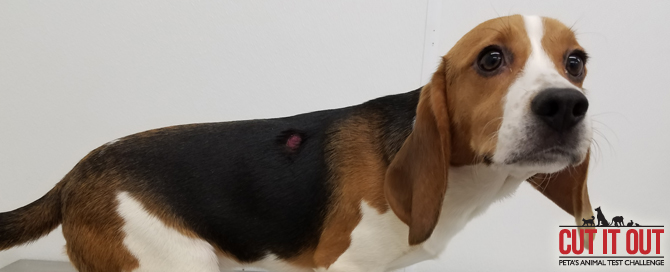 Footage captured inside the Liberty Research, Inc., laboratories in New York state by a PETA U.S. eyewitness has the makings of a horror movie.
Footage captured inside the Liberty Research, Inc., laboratories in New York state by a PETA U.S. eyewitness has the makings of a horror movie.
In one experiment, workers drilled into the skulls of young beagles so that distemper virus could be injected directly into their brains. Some dogs blinked and even whimpered during the procedure. Afterward, some banged their heads on the cages, causing blood to spurt from their wounds. Others foamed at the mouth or had seizures.
At the end of the study, they were simply killed.
Horrors experienced by dogs and other animals aren't limited to laboratories overseas. Cruelty is taking place right now, here and around the world, but today, you have a special chance to help end laboratory experiments on animals.
Donate to "Cut It Out"—PETA's Animal Test Challenge and help us work to stop dogs, cats, and other animals from being tormented in laboratories.
Inside Liberty's windowless industrial buildings, dogs were injected with insecticides … cats were locked away in a severely crowded room and forced to compete for food … and animals were heartlessly killed.
One cat named Jade (just "JAD4" to Liberty's experimenters) suffered from seizures for nearly a month. When the decision was finally made to euthanize him, a veterinarian advised a worker to check to see if there was a need for the dead cat's "body parts."
The abuse of animals in laboratories has to end. Donate right now to support PETA's campaigns to help stop cruel and deadly experiments on dogs, cats, and other animals.
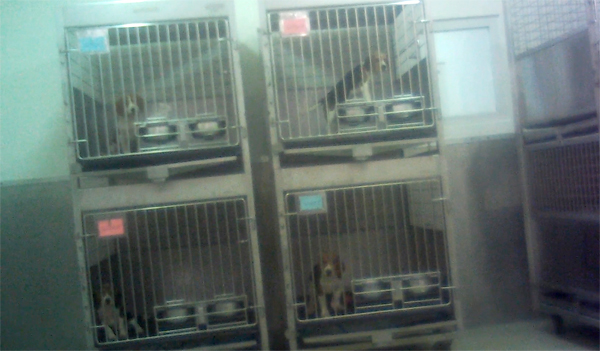 Many of these experiments at Liberty are being conducted for pharmaceutical giants like Bayer and Novartis, whose products are sold around the world. Liberty also breeds and sells thousands more dogs and cats to be cut up, poked, and prodded in experiments by other companies, regulatory agencies, and university researchers.
Many of these experiments at Liberty are being conducted for pharmaceutical giants like Bayer and Novartis, whose products are sold around the world. Liberty also breeds and sells thousands more dogs and cats to be cut up, poked, and prodded in experiments by other companies, regulatory agencies, and university researchers.
Today is your best opportunity to help PETA work to save dogs, cats, and other animals from hideous experiments. Please make a generous gift right now!
Dogs and cats at Liberty are being horrifically abused and deprived of everything that makes life worth living—we must do all that we can to help them.
Universities get billions of dollars a year from the National Institutes of Health (NIH) to conduct research - much of it done on live rats and mice. But with these substantial grants comes an understanding that the universities will abide by federal animal welfare guidelines in their treatment towards these lab rodents. Sadly, that is not always the case.
No clearer example can be made than that of the University of Minnesota which according to a recent report, ranks as one of the worst animal abusers when it comes to animal research. Yet, their more than five dozen violations over a 2.5 year period hasn't barred them from receiving American taxpayer funds. In one gruesome case, researchers drew blood from behind rodents' eyes. The animals weren't given any type of pain relief. These stories are unfortunately too common.
Although rats and mice make up 95% of lab test animals, they have no federal protections. Meaning that they can be drowned, suffocated, starved or denied pain relief by researchers, and there is no penalty for this abuse. So even if universities break their animal-care agreements with the government they are likely not to be punished.
That is not ok. The NIH needs to step up and ask for more of the schools they give our money to. Because every time a public dollar goes towards animal cruelty we become complicit in the abuse.
It is time we ask the NIH to deny research grants to schools that cannot abide by federal animal care guidelines. Sign the petition and tell the NIH "No Pain in My Name!"

| ||||||
|
| ||||||
| ||||||
According to the U.S. Department of Agriculture’s Animal and Plant Health Inspection Service, 820,812 animals were used last year for research, including 60,979 dogs and 18,898 cats.
Beagles are, sadly, the most commonly used breed in research. The beagle’s docility makes them the ideal candidate for biomedical laboratories, universities, medical, and veterinary schools. Beagles aren’t the only victims of lab experiments, however. People for the Ethical Treatment of Animals (PETA) estimates 100 million mice and rats are used in research each year.
Prior to the legislation, nicknamed Beagle Freedom Bill, the future for animals no longer needed for research was unclear. But now, if an animal is deemed adoptable by the institution’s veterinarian, the institution must make “reasonable efforts” to offer the animal up for adoption, either through private placement or an animal adoption organization, according to the Beagle Freedom Bill. “In most cases, like at the University of Illinois, once the animal is adoptable a lot of times students, family or faculty do adopt them,” said Sen. Linda Holmes, who sponsored the legislation.
The ultimate goal, of course, is to implement a ban on all animal testing. Until that happens – and if you’ve ever tried to lobby for animal welfare or environmental legislation, you know how painstaking the process is – we need to work towards smaller successes. Change will not occur overnight.
To learn more about Beagle Freedom Project, visit their website. They offer different ways to get involved, from organizing fundraisers to helping spread the word about the work they do. And if it’s doable, consider fostering or adopting a beagle previously used in research. (Of course, first, learn all you can about what it’s like to rehabilitate a former lab animal before bringing one home.) And please be sure to look for products that have a “cruelty-free” label, which signifies products were made without the use of animal tests. Image source: Clay Larsen/Flickr
| ||||||
|
| ||||||
| ||||||

It's said that bureaucracy kills initiative. In the case of the European Chemicals Agency (ECHA), bureaucracy may lead to killing animals in cruel and potentially avoidable experiments.
Donate Now!
Now, you have a special opportunity to help us work to stop the abuse of animals in laboratories.
Please go to "Cut It Out"—PETA's Animal Test Challenge today.
Under the Registration, Evaluation, Authorisation and Restriction of Chemicals (REACH) regulation, ECHA is still insisting on using animals to test chemicals, including cosmetics ingredients, under certain circumstances. Scientists with PETA's international affiliates have estimated that approximately 1 million animals have already been killed under REACH—deaths that were likely painful and slow. Animals are force-fed chemicals, and substances are applied to their eyes or sensitive skin, leading to terrible suffering and death, even though reliable, non-animal methods exist for many of the tests conducted.
This horror is still happening. As you read this e-mail, some 2,000 gentle mice, monkeys, rabbits, rats, and other animals are facing extreme suffering in reproductive and developmental toxicity studies—and more deadly tests will undoubtedly be requested in the coming months.
The impact of REACH is not confined to Europe but has a global influence, with millions of animals under threat from it and other, similar chemical-testing programs around the world.
Will you please support PETA's work against cruel experiments on mice, monkeys, rabbits, rats, and other animals with your gift today to "Cut It Out"—PETA's Animal Test Challenge?

I know a rabbit named Lela who is in the loving home of a PETA U.S. employee, and the thought of rabbits, mice, monkeys, rats, and other animals who are as precious and harmless as she is suffering in experiments makes me feel sick.
Animals are, at this very minute, facing horrific pain and misery in cruel tests. Please take action for them today by donating to "Cut It Out"—PETA's Animal Test Challenge.
A new school year brings a fresh start for students and teachers who want to make a difference for animals used in education. AAVS’ education division Animalearn is ready to assist those compassionate individuals who are eager to avoid dissection and embrace non-animal methods.
With your help, we can end classroom cruelty!
Animalearn works to raise awareness about the plight of animals used in education, and to effect change that benefits animals, students, and schools.
- A recent nationwide survey found that 75% of U.S. adults believe that students should have the right to refuse to participate in animal dissection.
- Studies show that students at all education levels, from kindergarten through college, learn as well or better with humane alternatives.
- Alternatives enable students to learn and instructors to teach without harming animals.
MAKE THE SWITCH: Animalearn’s comprehensive library resource, The Science Bank, offers over 650 innovative life science education products—all available to borrow for free!
SPECIAL RECOGNITION! At the 10th World Congress on Alternatives and Animal Use in the Life Sciences held last month, Animalearn, in collaboration with ARDF and the Institute For In Vitro Sciences, produced an award-winning poster that collates informative results from a survey of science teachers.
Workers stab huge needles into the veins of animals like 299, who suffer immensely in antitoxin factories in India. Each time, litres of blood are siphoned from their bodies, leaving them debilitated. And that's not all that's done to them – please read on.
Animal Welfare Board of India–authorised inspectors from PETA India and prominent veterinary colleges found 299 with a severe and crippling hoof condition. His thin body was covered with painful pressure ulcers. He was one of many horses, donkeys, and mules suffering from open wounds, malnutrition, and other serious health conditions in this shameful blood collection dump.
Will you help us end the misery of horses, monkeys, dogs, rabbits, and other animals by donating to "Cut It Out" – PETA's Animal Test Challenge today? Your much-needed gift will be matched – pound-for-pound – up to our £250,000 goal.
Antitoxins are important medicines, but believe it or not, many are still made using the same old, cruel methods developed more than a century ago. Pharmaceutical companies "harvest" them from the blood that's drained from donkeys, mules, and horses like 299. In this process, the animals are first injected with a poisonous substance (a toxin). Then, after their immune system has responded, a massive amount of their blood is drawn. But the misery endured by these animals goes far beyond the pain of being repeatedly poisoned and forcibly bled.
At these companies, PETA India's inspectors documented that, although there were paid veterinarians on the premises, severe health conditions – including anaemia, infections, swollen limbs, and malnutrition – were often ignored. Many of the animals were discovered in crowded, filthy enclosures, where they were forced to stand and lie in their own accumulated urine and faeces on hard floors that left some with painful joint conditions. Basic grooming and husbandry practices seemed almost non-existent, even as workers handled the animals to collect blood from them over and over again.
Nearly everywhere the inspectors looked, they found violations of laws and guidelines. Many of the facilities where they witnessed some of the worst abuse and neglect – including the one where they found 299 – weren't even registered with the Indian government authority that issues permits for these procedures!
By donating to PETA today, you'll help expose such hideous abuse – and strengthen our vital work to stop cruel experiments on animals.
Since the release of PETA India's disturbing inspection report, thousands of people have called for the Indian government to deny or revoke these horrific facilities' licences to use animals. But stopping the suffering of the thousands of horses, donkeys, and mules who are abused in antitoxin production will take more than closing a few facilities.
That's why the PETA International Science Consortium Ltd. – an organisation that coordinates the scientific and regulatory expertise of PETA and its affiliates – is funding ground-breaking new research into the manufacturing of antitoxins in laboratories. This exciting research is a critical step towards replacing cruel antitoxin production with modern methods that won't harm a single animal. As an added benefit, making antitoxins in the laboratory avoids the serious illnesses that humans can experience when they receive doses of antitoxins made from animals' blood.
Your generous donation during "Cut It Out" – PETA's Animal Test Challenge will go twice as far in ensuring that no other animal is forced to endure the pain and fear that 299 did.
I know that together, we can and will make a difference in the lives of horses and other animals who are facing a lifetime of misery, exploitation, and abuse.
Dogs and Cats Are Being Experimented on Right Now. Will You Help Them?

In one experiment, workers drilled into the skulls of young beagles so that distemper virus could be injected directly into their brains. Some dogs blinked and even whimpered during the procedure. Afterward, some banged their heads on the cages, causing blood to spurt from their wounds. Others foamed at the mouth or had seizures.
At the end of the study, they were simply killed.
Horrors experienced by dogs and other animals aren't limited to laboratories overseas. Cruelty is taking place right now, here and around the world, but today, you have a special chance to help end laboratory experiments on animals.
Donate to "Cut It Out"—PETA's Animal Test Challenge and help us work to stop dogs, cats, and other animals from being tormented in laboratories.
Inside Liberty's windowless industrial buildings, dogs were injected with insecticides … cats were locked away in a severely crowded room and forced to compete for food … and animals were heartlessly killed.
One cat named Jade (just "JAD4" to Liberty's experimenters) suffered from seizures for nearly a month. When the decision was finally made to euthanize him, a veterinarian advised a worker to check to see if there was a need for the dead cat's "body parts."
The abuse of animals in laboratories has to end. Donate right now to support PETA's campaigns to help stop cruel and deadly experiments on dogs, cats, and other animals.

Today is your best opportunity to help PETA work to save dogs, cats, and other animals from hideous experiments. Please make a generous gift right now!
Dogs and cats at Liberty are being horrifically abused and deprived of everything that makes life worth living—we must do all that we can to help them.


